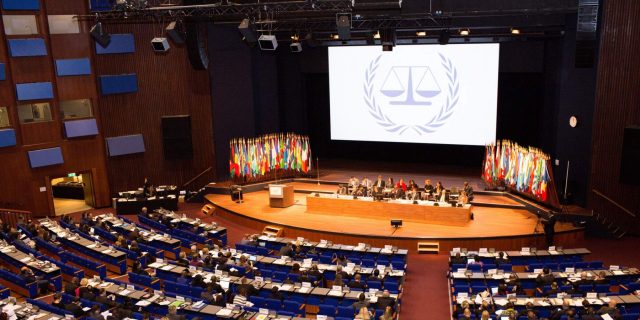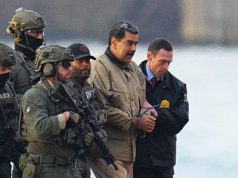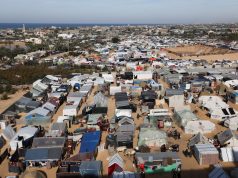By
The ICC at a Crossroads: Potential Conflicts of Interest and Credibility Risks
September 2, 2024, by ACD)
The International Criminal Court (ICC), established to bring justice to the world’s most grievous crimes, is now under intense scrutiny. Concerns have emerged regarding potential conflicts of interest and misconduct that may have compromised the integrity of key cases over the past two decades. Central to these concerns is the relationship between ICC prosecutor Karim Khan (highlights of his profile below), his wife, Dato Shyamala Alagendra, and Andrew Caylay, a colleague at the Temple Garden Chambers (TGC) legal set that they all belong to, and the significant roles they have all played in some of the ICC’s most high-profile cases over the past 20 years.
The ICC’s mandate is to ensure impartiality and justice, but the overlap in the professional and personal lives of Khan and Alagendra raises troubling questions. They met while on opposing sides of major international cases—she as a prosecutor and he as a defense attorney. This overlap is not merely incidental; it spans six international cases involving some of the most notorious figures in recent history, including former Military Generals of Kosovo, Liberian President Charles Taylor, Sudanese officials of Darfur, and members of the Gaddafi family.
Case Overlap and Potential Conflicts
Timor, Cancio Lopez de Carvalho, 2001: Khan served as the Lead Defense for Carvalho in the United Nations Transitional Authority for East Timor (UNTAET) before the Special Panel for Serious Crimes in East Timor while it was under United Nations administration (UNTAET). Carvalho was the head of the Mahidi Militia concerning allegations arising from the 1999 post-referendum violence. Alagendra served on the prosecuting team against the SPSC in East Timor at the same time.(1) As this is the earliest found case of the two opposing each other, it is assumed this is when they met, however, it is unclear when the romantic relationship began.
Charles Taylor, Sierra Leone (2006-2007): The horrific human rights violator, President Charles Taylro, who was found guilty on all 11 charges of war crimes and crimes against humanity and is currently serving his sentence in the United Kingdom, is one of the most significant and high-profile cases ever tried in the international courts. Alagendra was part of the prosecution team in this case, while Khan led the defense. The fact that Khan and Alagendra were on opposing sides again in such a high-profile case raises concerns about the impartiality of the proceedings, especially given their subsequent marriage.
In addition, Khan was accused of disrespecting the court by staging a “walkout” in the opening hearing, claiming he would not represent Taylor. Apparently, it was staged to buy time for the defense. Suspicions increased as Khan’s colleague from TGC, Andrew Caylay, was announced as Taylor’s new defense counsel.
Sudanese Officials, Bahar Idriss Abu Garda and President Omar Bashir (2008-2010): Alagendra was once again on the prosecuting team, this time against Sudanese President Omar Bashir of Sudan and senior government members for the ICC.(3) During the same period, Khan was the lead defense for Bahar Idriss Abu Garda. Today, the Abu Gharda case is considered closed unless the prosecutor files more evidence.(4) This case further exemplifies the misconduct of the court by appointing the former defense counsel as the new prosecution, and the case has conveniently been put on hold until evidence is submitted. Currently, Omar Bashir is wanted by the ICC, which has issued a warrant for his arrest, as they cannot proceed with charges in his absence. Both these cases concerned the war crimes committed in Darfur, with the same content, same location, and same crimes, yet the ICC enabled the cases to proceed with Khan on the defense and Alagendra on the prosecution, potentially jeopardizing the integrity of both cases, and the justice much awaited by the people of Darfur, Sudan.
Kenya, President William Ruto and Adv. Paul Gicheru (2008-Current): This ongoing case involving the current President of Kenya, Willian Ruto, and other senior officials is particularly concerning. As the case started when Khan and Alagendra were still on opposing sides of other live cases. Khan initially served as the defense counsel and assigned Shyamala Alagendra and potentially her relative, Venkateswari Alagendra to the case in May 2013.(5) The case was dismissed in 2016, but Ruto was not acquitted, as the court ruled there was insufficient evidence, in a split ruling, one judge declared it a mistrial because of a “troubling incidence of witness interference and intolerable political meddling”.(6)
Libya, Saif al-Islam Gaddafi (2011): Khan and Alagendra continued their co-defense career with this case involving Saif al-Islam Gaddafi, the son of the late Libyan leader Muammar Gaddafi. He was the lead, and she was the associate counsel as of May 2017.(7) She was added as the lead defense counsel in July 2018.(8) Khan recused himself from the case in November 2021, six months after he took office as the prosecutor of the ICC.(9) In this particular case, Alagendra’s direct involvement should have come into question regardless of her relationship with Khan, as she was still in her role as the prosecution team in the ICC in 2011 when the ICC case was filed against his father, Colonel Muammar Gaddafi.(10) This grave breach of integrity and trust in the ICC processes remains an unanswered red flag.
Their joint involvement in this case further complicates perceptions of impartiality, given Khan’s later role as a prosecutor. However, there is potentially an even more troubling act of misconduct, as the new prosecutor on this case is Deputy Prosecutor Nazhat Shaaman Khan (appointed to the role by Karim Khan in December 2021), married to Aslam Khan, born in the same region of Pakistan as Karim’s family – it is yet to be discovered if there is a family relationship between the two.(11) Nazhat Shaaman previously served as the judge of the High Court of Fiji, and her sister, Shaista served as the director of the Fiji Human Rights Commission.(12) As Alagendra recently spent a year (2018-2019) in Fiji as the Assistant Director of Public Prosecutions, and considering how this small group of family and friends set each up in various legal structures and systems, it would not be without substance to question if she was granted the position as a favor, or in terms not suitable for a proper vetting process for such a position.
Kosovo Conflict, Fatmir Limaj, 2003-2017: Khan represented Fatmir Limaj in the ICTY in his first case in 2003, alleged crimes against humanity. He was acquitted and then elected Minister of Transport and Communications. Limaj maintained a working relationship with Khan, who remained his lawyer in two separate cases against him that followed his Hague acquittal: the Klecka detention center war crimes case and the Kosovo Post-Telecommunication Ministry corruption case.(13)
Khan and Alagendra then worked together to defend Limaj again in 2010-2012 with charges of war crimes allegedly committed in Kosovo in 1999 before the EULEX (hybrid) court. This, too, was a successful case for Khan, and Limaj was acquitted. Following this, Khan was granted an honorary PhD from Pristina College FAMA in Kosovo – adding nicely to his CV, as he did not finish his actual doctorate studies at Wolfson College, Oxford.(14)
Recusals and the Integrity of the ICC
It is difficult enough to perceive how the current Chief Prosecutor of the ICC has had such an extensive career in defending the exact people he is now charged with prosecuting. It is almost inconceivable that the court would expect him to bring evidence against former clients, who will most likely continue to be his clients when he finishes his ICC term.
Nevertheless, it is particularly challenging to understand how the esteemed ICC could have sanctioned such reckless conduct among its appointed court barristers for decades. In these cases, the intertwined network between Prosecutor Khan, his family, and his friends is emblematic of the potential for compromised justice. There are many concerns that this misconduct endangers the credibility of the legal proceedings, raising legitimate questions about whether the ICC has adhered to the highest standards of impartiality.
The implications of these potential conflicts are profound. The ICC’s mission to uphold justice and accountability on the global stage is at risk. If its proceedings’ integrity is questioned, the very foundation of international justice could be shaken. The international community must now grapple with the possibility that some of the ICC’s most significant cases may need to be revisited—a prospect underscoring the need for rigorous oversight and transparency within the court.
As investigations into these matters continue, the ICC must confront the possibility that its most prominent prosecutor, his wife, and the newly appointed senior staff may have inadvertently or advertently compromised the very principles of fairness and justice that the court was established to protect. The outcome of these investigations will determine the fate of the cases in question and set a precedent for the future conduct of international justice.
__________________________________________________________
NOTES:
*Karim Asad Ahmad Khan, Chief Prosecutor of the International Criminal Court’s profile’s Highlights – He has a long career as a barrister specializing in international criminal law, with a background at Temple Garden Chambers (TGC) and significant involvement in various high-profile cases.
- ● Personal and Religious Background: Born on March 30, 1970, in Edinburgh, Scotland, Khan is deeply affiliated with the Ahmadiyya Muslim Community. This affiliation, along with his family’s influential role within the movement, raises concerns about potential biases, particularly in cases involving sensitive cultural and religious issues of equality and human rights.
- ● Professional Conflicts and Controversies: Khan’s professional history includes defending notorious war criminals and human rights violators, contrasting with his current role as a prosecutor. His marriage to Dato Shyamala Alagendra, who often served as a prosecutor in cases where Khan was the defense counsel, further complicates perceptions of conflict of interest and misconduct.
- ● ICC Tenure: Since his appointment, Khan has been involved in several controversial decisions, particularly regarding investigations into Israel and Palestine. His actions have drawn criticism, with some questioning the legitimacy of his decisions, the potential influence of his personal and religious affiliations, and the professionalism of his work procedures.
- ● Concerns and Recommendations: Given his complex personal and professional relationships, the profile raises significant concerns about Khan’s ability to impartially execute his duties at the ICC. It suggests potential conflicts of interest and misconduct, recommends a thorough review of his actions under the Rome Statute, and explores avenues for his potential removal from office.
- ● Targeted Actions: Suggestions include challenging his stance on human rights, leveraging judicial processes to investigate or remove him, and launching a media campaign to expose his background and potential conflicts of interest. (by VALOP)
____________________________________________________________________
1) Shyamala Alagendra Experience CV on Linkedin.
2) UN, Interview with Shyamala Alagendra, and Data Shyamala Alagendra, Profile TGC.
3) ICC Case Overview for Omar Bashir.
4) ICC Case Overview of Bahar Idriss Abu Garda.
5) ICC Court Appointment Notice for the Alagendras to the William Ruto Case.
6) BBC News, Kenya’s William Ruto’s case dismissed by ICC, 5 April 2016.
7) ICC Court Appointment Notice for Khan and Alagendra to Said al-Islam Gaddafi case.
8) ICC Court Appointment Notice for Alagendra to Said al-Islam Gaddafi case.
9) The Libya Observer, ICC Prosecutor recuses himself from Saif Al-Islam Gaddafi’s case, 24 November 2021. 2 UN, Interview with Shyamala Alagendra, and Data Shyamala Alagendra, Profile TGC. 3 ICC Case Overview for Omar Bashir.
10) BBC, Libya: ICC prosecutor seeks warrant for Gaddafi, 16 May 2011.
11) Nazhat Shameem, Wikipedia Profile.
12) Shaista Shameem, Wikipedia Profile.
13) Balkan Transitional Justice, Kosovo: Shadowy Funds Raise Corruption Fears. 23 December 2013
14) Karim Khan, CV from the TGC website





